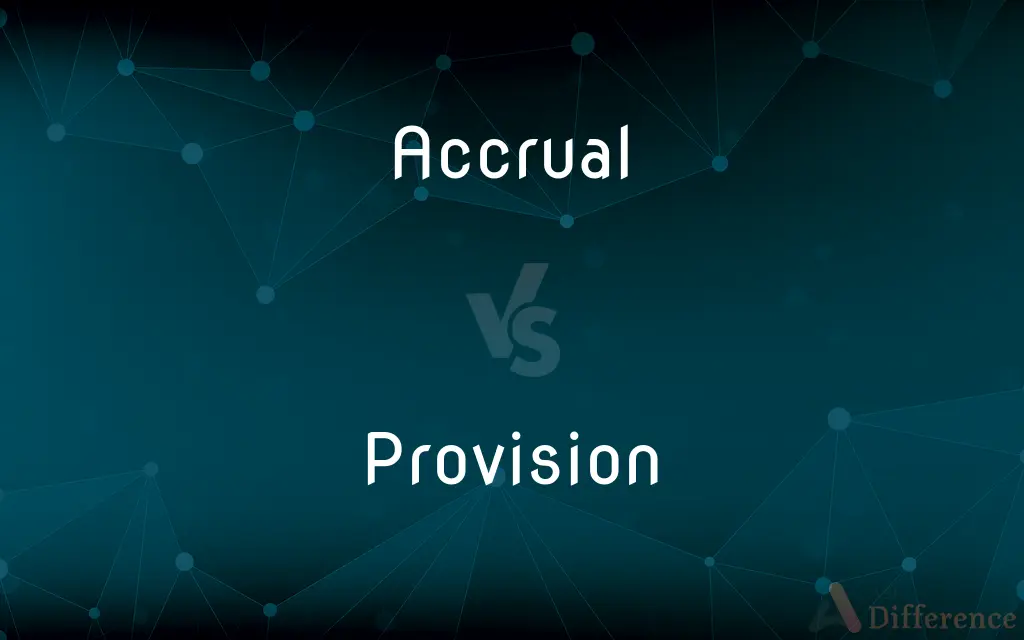Accrual vs. Provision — What's the Difference?
By Tayyaba Rehman — Updated on October 30, 2023
Accrual involves recording revenue or expenses when incurred, regardless of cash flow. Provision is setting aside funds for future liabilities or expenses.

Difference Between Accrual and Provision
Table of Contents
ADVERTISEMENT
Key Differences
Accrual accounting is a method where revenue and expenses are recorded when they are earned or incurred, not necessarily when cash is exchanged. This concept is essential for matching expenses with the revenues they generate. On the other hand, a provision refers to a financial amount set aside in the accounts to cover a future liability or decrease in the value of an asset. Provisions are a form of saving for future uncertainties.
The accrual system ensures that financial statements reflect the true financial position of a company by recording transactions in the period they occur. In contrast, provisions are used to manage potential financial impacts by recognizing future liabilities or losses. While accruals affect both the income statement and the balance sheet, provisions primarily affect the balance sheet by creating a liability.
Accruals are a part of the broader accrual accounting system, which is based on the matching principle. This principle states that revenues and expenses should be recognized in the period they are incurred. Conversely, provisions are more about financial prudence, created in anticipation of future liabilities or losses, such as warranty expenses or legal settlements.
While accruals may involve adjusting entries at the end of an accounting period to reflect earned revenues and incurred expenses, provisions are more about cautious financial planning. Provisions are usually based on estimates and are subject to change as more information becomes available or circumstances change.
Both accruals and provisions are essential for accurate financial reporting, but they serve different purposes. Accruals ensure that financial statements provide a fair representation of a company's performance over a period, while provisions help manage future financial risks by setting aside funds to cover anticipated liabilities or losses.
ADVERTISEMENT
Comparison Chart
Definition
Recording revenues/expenses when incurred.
Setting aside funds for future liabilities.
Financial Statement Impact
Affects both income statement and balance sheet.
Primarily affects the balance sheet.
Basis
Based on the matching principle.
Based on estimates of future liabilities.
Purpose
Reflect true financial position and performance.
Manage financial risks and uncertainties.
Timing
Involves adjusting entries at the end of a period.
Created in anticipation of future events.
Compare with Definitions
Accrual
Recording of revenue when earned, not received.
The company recorded an accrual for services rendered, though payment was yet to be received.
Provision
Setting aside funds for anticipated future liabilities.
The company made a provision for potential legal settlements.
Accrual
Recognition of expenses when incurred, not paid.
Despite not paying the supplier, the accrual for raw materials was recorded.
Provision
A conservative approach to manage financial uncertainties.
To cover potential damages, a provision for contingencies was established.
Accrual
An adjustment for revenues and expenses not yet cash transactions.
Salary accrual ensured the financial statements reflected staff costs.
Provision
The act of providing or supplying something
The provision of health care.
The provision of rations.
Accrual
An integral part of accrual accounting for accurate reporting.
The accrual of utility bills ensured accurate monthly expense reporting.
Provision
The act of making preparations for a possible or future event or situation
The provision for retirement requires planning.
Accrual
An accounting method reflecting transactions in the period they occur.
The accrual of interest expenses showed the company's financial obligations.
Provision
Something provided
A fire escape is an important provision in a building.
Accrual
Accrual (accumulation) of something is, in finance, the adding together of interest or different investments over a period of time. It holds specific meanings in accounting, where it can refer to accounts on a balance sheet that represent liabilities and non-cash-based assets used in accrual-based accounting.
Provision
Provisions Necessary supplies, such as food and clothing, as for a journey.
Accrual
The act or process of accumulating; an increase.
Provision
A preparatory action or measure
We must make provisions for riding out the storm.
Accrual
Something that accumulates or increases.
Provision
A particular requirement in a law, rule, agreement, or document
The constitutional provision concerned with due process.
Accrual
An increase; something that accumulates, especially an amount of money that periodically accumulates for a specific purpose
Provision
To supply with provisions.
Accrual
(accounting) from the creditor's viewpoint, a charge incurred in one accounting period that has not been, but is to be, paid by the end of it.
Provision
To take preparatory action or measures
A bank must provision against losses from bad loans.
Accrual
Accrument.
Provision
An item of goods or supplies, especially food, obtained for future use.
Accrual
The act of accumulating
Provision
The act of providing, or making previous preparation.
Provision
Money set aside for a future event.
Provision
(accounting) A liability or contra account to recognise likely future adverse events associated with current transactions.
We increased our provision for bad debts on credit sales going into the recession.
Provision
(law) A clause in a legal instrument, a law, etc., providing for a particular matter; stipulation; proviso.
An arrest shall be made in accordance with the provisions of this Act.
Provision
(Roman Catholicism) Regular induction into a benefice, comprehending nomination, collation, and installation.
Provision
A nomination by the pope to a benefice before it became vacant, depriving the patron of his right of presentation.
Provision
(transitive) To supply with provisions.
To provision an army
Provision
To supply (a user) with an account, resources, etc. so that they can use a system.
Provision
The act of providing, or making previous preparation.
Provision
That which is provided or prepared; that which is brought together or arranged in advance; measures taken beforehand; preparation.
Making provision for the relief of strangers.
Provision
Especially, a stock of food; any kind of eatables collected or stored; - often in the plural.
And of provisions laid in large,For man and beast.
Provision
That which is stipulated in advance; a condition; a previous agreement; a proviso; as, the provisions of a contract; the statute has many provisions.
Provision
A canonical term for regular induction into a benefice, comprehending nomination, collation, and installation.
Provision
A nomination by the pope to a benefice before it became vacant, depriving the patron of his right of presentation.
Provision
To supply with food; to victual; as, to provision a garrison.
They were provisioned for a journey.
Provision
A stipulated condition;
He accepted subject to one provision
Provision
The activity of supplying or providing something
Provision
The cognitive process of thinking about what you will do in the event of something happening;
His planning for retirement was hindered by several uncertainties
Provision
A store or supply of something (especially of food or clothing or arms)
Provision
Supply with provisions
Provision
A financial safeguard against potential losses.
A warranty provision was created for future product repairs.
Provision
An accounting entry for estimated future expenses.
The business created a provision for doubtful debts.
Provision
An amount earmarked in financial statements for specific future use.
A provision was recorded for the decommissioning costs of equipment.
Common Curiosities
Why are provisions important?
Provisions are important for financial prudence, helping companies manage future financial risks and uncertainties.
What is the matching principle in accrual accounting?
The matching principle states that revenues and expenses should be recognized in the same period they are incurred, ensuring accurate financial reporting.
What is a provision in accounting?
A provision is an amount set aside in the financial statements to cover a future liability or decrease in the value of an asset.
How does an accrual affect financial statements?
Accruals affect both the income statement and balance sheet by recording revenues and expenses in the period they occur.
What's an example of an accrual?
An example of an accrual is recording interest expenses incurred in a month, even if the payment will be made later.
What happens if a provision is overestimated?
If a provision is overestimated, it may be adjusted in future periods, reducing the provision and impacting the profit and loss.
What is accrual accounting?
Accrual accounting is a method where revenue and expenses are recorded when they are earned or incurred, regardless of when cash is received or paid.
When are provisions typically created?
Provisions are created in anticipation of future liabilities or losses, such as warranty expenses or potential legal issues.
Are provisions based on exact amounts?
No, provisions are usually based on estimates and can change as more information becomes available or circumstances change.
Are accruals and provisions only relevant for large companies?
No, accruals and provisions are relevant for businesses of all sizes for accurate financial reporting and prudent financial management.
Can accruals affect a company's cash flow?
Accruals do not directly affect cash flow since they record transactions irrespective of cash movement.
Do accruals require adjusting entries?
Yes, accruals often involve adjusting entries at the end of an accounting period to reflect earned revenues and incurred expenses.
Is accrual accounting mandatory for all businesses?
Accrual accounting is generally required for publicly traded companies, while small businesses may use cash-based accounting.
What's an example of a provision?
An example of a provision is setting aside funds for anticipated product warranty claims.
Can provisions change over time?
Yes, provisions can be adjusted based on new information or changes in circumstances.
Share Your Discovery

Previous Comparison
Cough vs. Sofa
Next Comparison
Aspergillus vs. PenicilliumAuthor Spotlight
Written by
Tayyaba RehmanTayyaba Rehman is a distinguished writer, currently serving as a primary contributor to askdifference.com. As a researcher in semantics and etymology, Tayyaba's passion for the complexity of languages and their distinctions has found a perfect home on the platform. Tayyaba delves into the intricacies of language, distinguishing between commonly confused words and phrases, thereby providing clarity for readers worldwide.














































